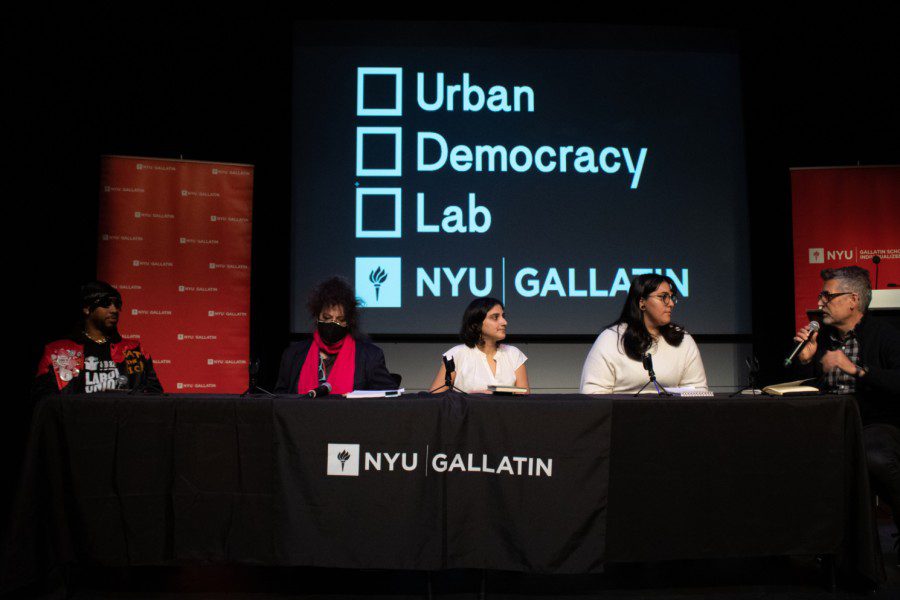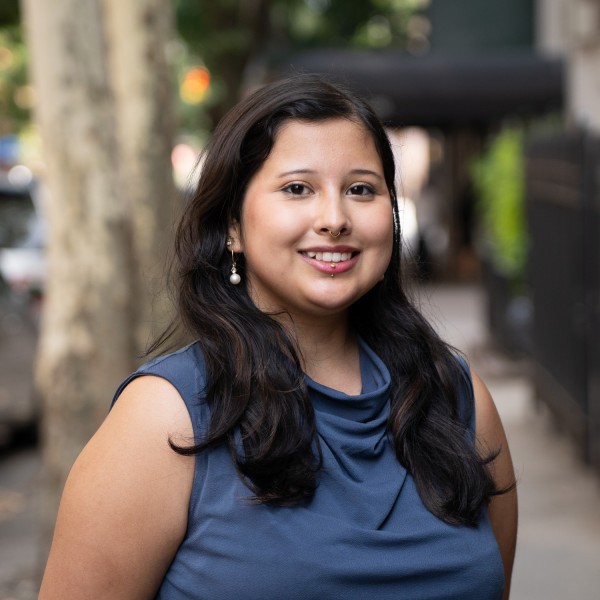Union leaders from NYU and NYC look to the future of labor
Representatives from unions on and off campus discussed the labor movement’s present struggles and future hopes at an NYU panel on Nov. 15.
Labor leaders talked about the future of organzing at panel hosted by NYU’s Urban Development Lab. (Jennifer Ren for WSN)
November 16, 2022
New York City union leaders, including two from NYU, discussed recent labor wins on campus, a nearby Starbucks strike, and the future of union organizing during a panel hosted by the university’s Urban Democracy Lab on Tuesday, Nov. 15. Representatives from GSOC, NYU’s graduate student union, and ACT-UAW Local 7902, the university’s adjunct union, took part in the panel alongside Amazon and Starbucks union leaders.
Prominent labor leaders — including Chris Smalls, the lead organizer of Amazon’s first labor union in Staten Island — addressed existing obstacles to unionization and encouraged NYU students to become involved in labor organizing. Arundhati Velamur, an organizer for GSOC, Judith Sloan, a member of NYU’s adjunct union, and Athena Kosmopoulos, a member of the Starbucks Roastery union, were also in attendance.
Smalls said that while unions have historically organized secretly, the current generation of labor leaders make their movements visible as early as possible. He added that unions can garner public support through social media and connect with their communities by publicizing unionization efforts.
“The way we use TikTok, the way we use social media, the way we use everything is so important to connect with everybody,” Smalls said. “It’s about connecting with them on a personal level.”
Though she describes herself as an old-school union organizer, Sloan said she has learned to use social media to promote the NYU adjunct faculty union’s efforts to younger audiences. The union recently renewed its contract with the university following a strike authorization vote, and ultimately won better compensation, added healthcare coverage and other benefits.
Kosmopoulos, a current Starbucks employee, spoke about the ongoing strike at the Starbucks Reserve Roastery at 61 Ninth Ave., the first-ever location in the city to unionize. The union has been on strike since Oct. 25 due to alleged health violations in the workplace, including moldy ice and bedbugs. Kosmopoulos said that Starbucks’ public image conceals its harmful practices.
“They like to show the picture to everyone else that they care, but that’s just not the case,” Kosmopoulos said.
To close out the discussion, the panelists predicted what the future of the global labor movement might look like. Three of the participants, including GSOC’s Velamur, said that workers of all backgrounds across the country should hold a general strike within the next five years to demand increased protections from the government. Kosmopoulos added that they are optimistic that the new generation of the labor movement will avoid ethical issues like corruption that have caused problems for unions in the past.
Smalls, whose union has still not been able to bargain with Amazon, said that he thinks the movement should focus on the present before thinking about long-term plans. He also warned the audience that a Republican victory in the 2024 presidential election would lead to anti-union changes in the National Labor Relations Board.
“If we lose the administration, the first thing they’re going to do on day one is they’re going to fire everybody,” Smalls said. “Forget about our election, the history we made, the movement that we got going — the momentum that we’ve got going is going to be stamped out.”
Velamur emphasized the importance of empowering workers, urging students and city residents to support ongoing strike efforts by joining picket lines and donating to strike funds. She added that worker’s rights intersect with other social justice efforts.
“It’s about racial justice, it’s about criminal justice, it’s about making sure that we find alliances and solidarity across these different working class groups,” Velamur said. “The Starbucks struggle is the students’ struggle, and the Amazon workers’ struggle is everyone’s struggle. We are all in this together.”
Contact Tori Morales at [email protected].
























































































































































